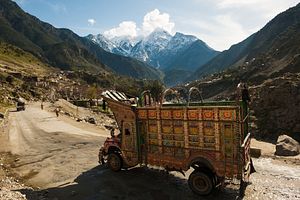China has recently extended Pakistan a much-needed economic lifeline, announcing infrastructure projects that could boost trade and investment. The China-Pakistan Economic Corridor (CPEC) will connect the western Chinese city of Kashgar with the Pakistani port of Gwadar, in the province of Balochistan, near the Iran-Pakistan border. The project would give Pakistan’s poorest province an economic boast and China access to another route to the Indian Ocean and the Middle East, while connecting many Pakistani cities in between.
Many in Pakistan have hailed the corridor as proof of the eternal and amazing friendship between China and Pakistan, though obviously realpolitik is more likely at work here than anything. After all, a recent article notes that while China has proved a reliable and steady partner for Pakistan, many Chinese do not think highly of Pakistan. China has also proposed economic corridors the Indian Ocean through India and Myanmar.
International relations aside, one of the largest controversies surrounding the CPEC has been a domestic one in Pakistan. The controversy has arisen over the route of the corridor, and the only points of agreement are that it should go from Kashgar to Gwadar. Although politicians from Pakistan’s western and poorer provinces of Khyber-Pakhtunkhwa (KP) and Balochistan expected the route to pass through their provinces, the final route actually ended up shifted east, passing mostly through the more prosperous and politically dominant Punjab (and to a lesser extent, Sindh) provinces.
The Chief Minister of KP, Pervez Khattak, addressing a press conference, said that the original route was meant to go mostly through cities in his province and Baluchistan (and a couple in Punjab and Gilgit-Baltistan): Khunjerab, Gilgit, Kohistan, Shangla, Battagram, Mansehra, Abbotabad, Haripur, Hassanabad, Mianwali, Dera Ismail Khan, Dera Ghazai Khan, Dera Murad Jamali, Khuzdar, Panjgur and Gwadar.
According to a map provided by BBC News, the route will pass through Islamabad and Lahore now. However, the Pakistani government denied any change to the route. Federal Minister for Planning Ahsan Iqbal said that the project should not fall victim to provincial rivalry: “This impression that the route has been changed is wrong. Turning this into an issue of conflict between provinces is tantamount to sabotaging billions of dollars of investment.”
If the route were changed at some point, though, it is unlikely that it was changed for economic or political reasons alone. Rather, it could have shifted eastward for security reasons, possibly at the request of China, which wants its workers and vehicles to be secure. KP is home to significant Taliban and militant activity while
Balochistan’s lawlessness is increasing due to multiple insurgencies. Chinese workers in Balochistsan have been targeted before.
It remains to be seen how swiftly the new route will be built, and if it will improve the security or economic situation of western Pakistan.
































